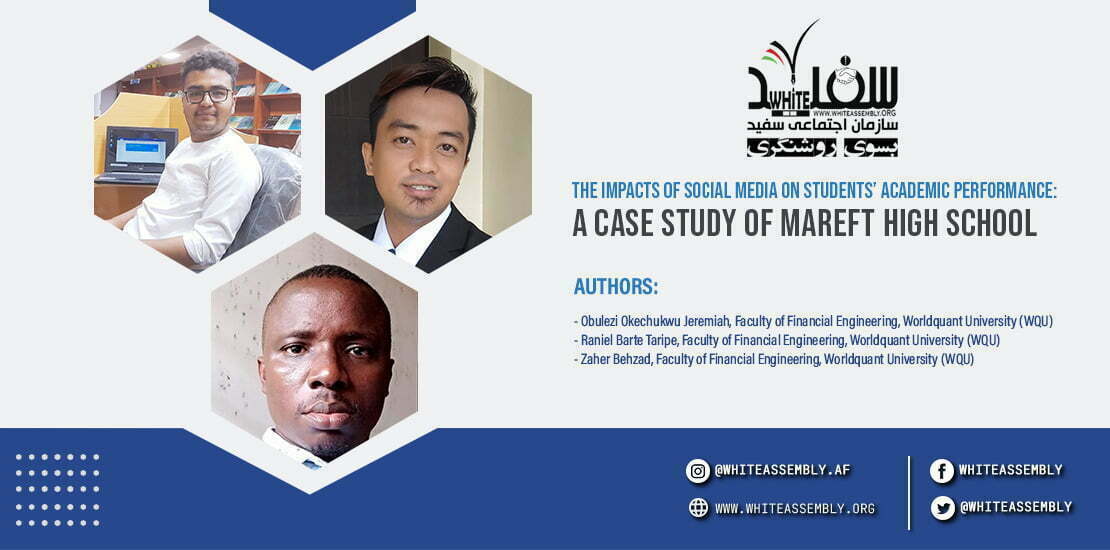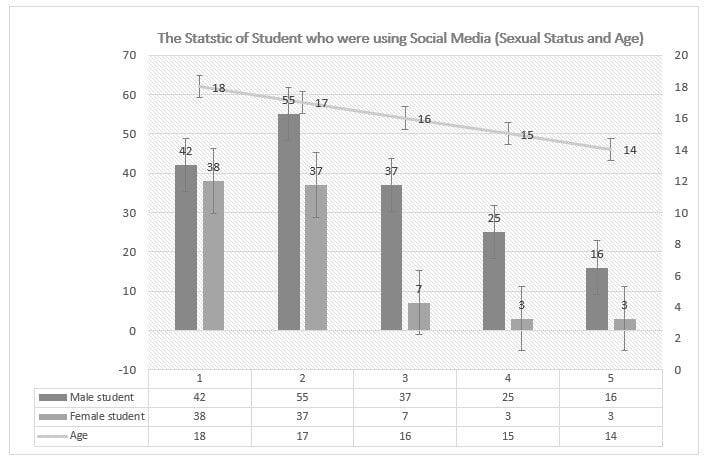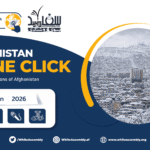
The Impacts of Social Media on Students’ Academic Performance: A Case Study of Mareft High School
Abstract
The paper main purpose is to study the impacts of using social media by high school students on their academic performance. The paper method is descriptive disciplinary with a casual trend that comprises all Mareft High School students who were studying in 2020-2021 as society population. The two hundred-eighty-two students are chosen through simple random sampling by Cochran Formula as statistical sample. The paper information is collected via questionnaire and the data is analyzed by Excel and SPSS software. The paper result shows that 97% male and 91% female students are users of social media and 92% of students are using Facebook in most. The result of paper indicates that social media have negative impacts on students’ academic performance such as, they have negative effects on students’ grade average points or academic dropping.
Key words: Social media, High school students, Academic performances, Negative circumstance and Social media users.
Introduction
The twenty-first century knows as communication, software movement and data explosion era that they influence on people’s live deeply. Software movement joins everywhere with together to facilitate connections between people for exchanging information better through social media, so social media turn the vast world into a small village of communications.
There is no doubt that the students are the most vulnerable class of society form social media because they keep in touch with each other through social media as the main users. The result of one study in Koforidua University in Ghana shows that 57% users of social media are students who are between 18 up to 21 years old (Acheaw and Larson, 2015, Page 94). The finding of another study in Louisville University indicates that 85% users of Facebook are university students (Mathew, 2017, Page 12). The high number of using social media by students makes worry educational scientists and specialists about their circumstances on students’ academic life.
The scientists begin doing some studies about the impacts of social media on students’ conditions in large scale. The outcomes of some recent studies show that utilizing of social media have both negative and positive impacts on student. The scientists count mental health disorder, academic dropping and addict to phone as negative points of this type of media on students and developing communication between students as positive point of social media on them.
Statement of Problems
Students always deal with scientific universe, so a small mutation of science can effect on them in a huge level. Social media are one of the most recent scientific achievements that they move into common bridge between students. It means students always get in touch with each other through social media.
The paper writers believe that negative impacts of social media are more rather than positive impacts of this type of media, so they struggle to reveal the negative points of social media by accomplishing this research under title of “The study of social media’s impacts on students’ academic performances”.
The Importance of Study
In the present days, students can contact with anyone they want, everywhere at any time and share their information among themselves that such ease in their relationships is one of the positive effects of social media. The media are considered as the most recent phenomenon of the scientific and technological achievements of the world which have become much more common among students since last one and half decades and have changed to the main channel for their communications.
This scientific-technological achievement has many positive and negative points and even could declare; social media have become inseparable part of students’ lives which have overshadowed all their live dimensions. A new finding of research shows the positive effects and consequences of social media on student`s live; students after joining social media have more sense of belonging to the society, adherence to community values and knowing themselves as a partner in the grief and pain of society (Acheaw & Larson, 2015, page 95). However, American students join Facebook to provide relationships and continue them versus Iranian student join Facebook to update their news (Taqwaie, Yazadi & Chitsaz, 2016, page 810). A survey on Khalij University Students indicates that almost more than fifty percent of them use Telegram to share information and news, communicate and be on contact their classmates (Sarafzada & Alavi, 2015, page 99).
There are some studies about negative effects and consequences of social media on student`s lives result shows that most of the students usually surf social media one of twenty-four hours of their time (Gok, 2016, page 89). Students who are users of Facebook, the most popular social media, have 3 to 3.5 GPA and 1 to 5 study hours per week versus those students who are not Facebook users have 3.9 to 4 GPA and 11 to 15 study hours per week (Acheaw & Larson, 2015, page 96). Continuous use of internet cause disinteresting to lessons and impressive decreasing scores on tests (Solimani, Sadipoor & Asadzada, 2016, page 130). According to the above research findings can state social media have positive and deep negative consequences on various dimensions of student lives and their academic performance.
The Purposes of Study
The paper main purpose is to figure out the impacts of social media on students’ academic performance as the main users and the four sub purposes of the paper are in below that realize under the main purpose.
- To understand the relationship between social media and students’ health mental;
- To understand the relationship between social media and students’ grade point average;
- To understand the relationship between social media and students’ time wasting;
- To understand the relationship between social media and students’ academic interesting.
The above sub-purposes have direct links with the main purpose of paper and have indirect links with the academic progress of students.
Literature Review
- Theoretical Literature:
Social media are type of networks which connect different parts of the world via internet and have provided the possibility of familiarity among people. In 1995, G.E. Barrens was the first one who uses the expression of social media to study links and social webs in a village in Norway. He believes all the social lives have the possibility to consider as a set of dots that they are connected with each other through lines and they make a general network by the name of social networks (Taqwaie, Yazadi & Chitsaz, page 79). In 1960, the University of Illinois was the first institution where discussed the concept of social networks as its modern concept (Islami, 2016, page 5). With considering social media as its modern concept, Six Degree was the first social media which was created in 1997 and the media gave its users the possibility of joining together, using appropriate work atmosphere and finding friends there (Islami, 2016, page 6). In 2004, Mark Zuckerberg, a Harvard student, underpins the evolved generation of social network by designing Facebook (Islami, 2016, page 8). Facebook is considered as the most popular social media now which has more than half billion users, 85 percent of them are students, and it is titled the third most populated region after China and India (Acheaw & Larson, 2015, page 94).
With the passing of time and the prevalence of social media among the people, Goldberg was the first one who noticed effects of internet social networks on people`s lives especially students as main users of social networks. In 1998, with publication of a paper titled “addiction to internet and internet social networks” he attracted attentions of many researchers and scholars to the impacts of social media (Hussainpor, Askari & Ayati, 2016, page 69). In 1998, Yang and his colleagues did the first study about the effect of social media on students in Taiwan and the result shows using social networks without limitation has harmful consequences such as personal disorder (Karimi & Amenzada, 2013, page 44). In 1988, Groats conducted the second study about effect of social media, psychological studying the users of Match-Maker which is a system of setting electronic meeting; the findings of study indicate Match Maker caused shameful people became non-shameful people which was one of Match Maker consequences (Wadoodi & Delawar, 2015, page 45). Goffman was one of the first people who published a book about the impacts of social media on people`s mind by the name of “Stigma” and he wrote in a part of that, “Exaggeratory discussions and writings can poison the audiences` personality characteristics and mentality about user, but stating sympathy can attract huge sponsorships and supports of audiences in cyberspace” (Wadoodi & Delawar, 2015, page 43).
- Empirical Literature:
In the recent days, social media are changed into the main connected channel among students in different levels and different parts of the world. Undoubtedly, they have positive and negative consequences on the academic performance of the students, and studies from various dimensions on the effects of social media on different aspects of academic performance of students have been conducted the following researches.
Sarafzada & Alevi (2013) in one study under title of “Studying the Position of Online Social Networks among University Students” achieved that social media have significantly improved and increased the relationships between students of different gender, and also states that social networks have been the basis for the implementation of modern or distance education in educational institutes. Abdullahi, Gharelengi and Samadi (2014) in another study by the name “The Negative Effects of Social Media, Including Facebook, on Students at the University of Asia-pacific in Malaysia” presents their findings as follows; the use of social media by students has had a negative and completely negative effect on their GPA or the amount of their academic achievements, and has ultimately led to their addiction to social networks.
Rabiee & Yazadi (2016) in one study by the name of “Cyberspace Pathology; Studying the Impact of Internet Use on Students ` Social Isolation” found using the social media during studying causes social isolation on students that this causes to mar one of the significant goals of education which is socializing students. Taqwaie, Yazadi & Chitsaz (2016) found how much students use social networks, much they will enjoy wider social relations and high social support in the community in study, “The Studying the Relationship between Social Networks and Students` Social Health, they did”. Solimani, Sadipoor & Asadzada ( 2016) in another study by the name of “Studying the Relationship between Virtual Social Space and Students` Academic Procrastination, feeling Lonely and Mental Health” shows the using of virtual social space on the one hand has caused a feeling of loneliness and mental health in students, and therefore they turned to social networks, but on the other hand, virtual social space have harmed their mental health, students` tendency to isolate and create virtual contexts instead of real ones in society is proof of this claim.
Hussainpor, Askari and Ayati (2016) in a research under title of “Studying the Relationship between Student`s Internet and Phone Addiction and Academic Burnout” figure out that their findings continued use of the internet, especially virtual networks, makes students addicted to them and ultimately leads to a feeling of tiredness during their studies, their lack of interest in lessons and academic inefficiency. Kubra Imamiriza (2016) in a research by the name of “The Effects of Using Virtual Social Networks on Students` Academic Achievement” finds out the using of social media leads to sleep disorders, lesson fatigue and ultimately reduced academic achievement of students. Tolga (2016) in a study called “The Study of the Effects of Social Networks on Students` Study and Habits” detects that the male and female students use alike from social networks more than an hour per day to expand and improve their relationships in the community. In another study under the name of “Students` desire to Use Internet Social Networks” by A. B. Johan (2017) indicates that student`s continued use of social networks has led to students becoming addicted to internet social networks which has led to drop in grades of educational exams.
Methodology:
The paper method of researching is a descriptive disciplinary with a casual trend that comprises all Mareft High School students who were studying in 2020 as society population. The one hundred-eight one male students and one hundred-five female students, totally two hundred-eight two persons, are chose through simple random sampling by Cochran Formula as statistical sample. The paper data collected by distributing of questionnaire between statistical sample that questionnaire designed through Likert spectrum and confirmed by Alpha Cronbach text with coefficient 0.915, and the aggregated data are analyzed through Excel and SPSS software.
Note: The calculation in Cochran Formula, N is society population, t is assurance level, d is error amount, P is study’s estimation and Q is the non-study’s estimation in below.

Results:
In this study, 290 questionnaires were distributed for gaining information and 278 questionnaires were collected that regaining questionnaires shows 97% of male students and 91% of female students are users of social media.
| Inductors | User of Social Media (Yes) | User of Social Media (No) | ||||||||
| Age of Student | 18 | 17 | 16 | 15 | 14 | 18 | 17 | 16 | 15 | 14 |
| Male Student (Amount of Student) | 42 | 55 | 37 | 25 | 16 | 3 | 3 | 0 | 0 | 0 |
| Female Student (Amount of Student) | 38 | 37 | 7 | 3 | 3 | 5 | 1 | 2 | 1 | 0 |

- The Impact of Social Media on Students’ Academic Interesting
The first three questions of questionnaire pay to the impact of social media on students’ academic interesting. It means the main purpose of these questions in first component of questionnaire is measurement the effect of social media utilizing by students on their interesting to their lessons.
compiled data present that social media cause kind of reluctance to lessons between students who are members of social media and the findings match to Hussainpoor, Askari and Ayati study that indicates negative effect on students’ academic interesting. For more detail see the noted chart and graph in below.
| Questions | Very High | High | Medium | Low | Very Low |
| Does using social media cause type of losing the meaning of lessons to you? | 28.5% | 36% | 14.7% | 12.0% | 10.9% |
| Does using social media cause type of losing patience to you during study? | 25.0% | 39.9% | 17.2% | 11.5% | 6.9% |
| Does using social media cause sometimes being absent in your class? | 30.5% | 37.9% | 16.0% | 4.3% | 1.0% |
| (Quantitative Statistic I) | |||||
| Questions | Mean | Meaningful Level | T Statistic | result |
| Does using social media cause type of losing the meaning of lessons to you? | 3.4 | 0.00 | 18.9 | Approval |
| Does using social media cause type of losing patience to you during study? | 3.9 | 0.00 | 17.8 | Approval |
| Does using social media cause sometimes being absent in your class? | 3.5 | 0.00 | 17.3 | Approval |
| (Qualitative Statistic I) | ||||
- The Impact of Social Media on Students’ Time Management
The second three questions of questionnaire allow to know about the effect of social media on students’ time management. It means the objective of these questions in second component of questionnaire is measurement the impact of social media using by students on their time management during their school.
Collected data display which social media draw on type of disorder to students’ time management who use the media and the results match to Acheaw and Larson study that exposure negative effect on students’ study time. For more detail see the noted chart and graph in below.
| Questions | Very High | High | Medium | Low | Very Low |
| How much does using social media cut your time of regular study? | 28.5% | 36% | 14.7% | 12.0% | 10.9% |
| How much does using social media cut your extracurricular activities such as being in your music band? | 25.0% | 39.9% | 17.2% | 11.5% | 6.9% |
| How much does using social media cut your sleeping time? | 30.5% | 37.9% | 16.0% | 4.3% | 1.0% |
| (Quantitative Statistic II) | |||||
| Questions | Mean | Meaningful Level | T Statistic | result |
| How much does using social media cut your time of regular study? | 3.2 | 0.00 | 16.9 | Approval |
| How much does using social media cut your extracurricular activities such as being in your music band? | 3.1 | 0.00 | 17.0 | Approval |
| How much does using social media cut your sleeping time? | 3.8 | 0.00 | 17.2 | Approval |
| (Qualitative Statistic II) | ||||
- The Impact of Social Media on Students’ Grade Average Points
The third three questions of questionnaire let to understand about the effect of social media on students’ Grade Average Point-GAP for short. It means the goal of these questions in third component of questionnaire is measurement the impact of social media using by students on their GAP during their school.
Collected data exposure that social media effect on students’ grade average points in bad way, it means those students who are members of social media and the findings match to Abdullahi and his co-workers study that shows the media cause decreasing students’ GAP. For more detail see the addressed chart and graph in below.
| Questions | Very High | High | Medium | Low | Very Low |
| Does using social media effect on your assignment doing? | 40.9% | 29.3% | 16.0% | 9.0% | 6.0% |
| Does using social media effect on your class learn? | 27.9% | 23.7% | 22.0% | 16.9% | 9.0% |
| Does using social media effect on your final grade | 49.9% | 32.7% | 14.0% | 4.3% | 1.0% |
| (Quantitative Statistic III) | |||||
| Questions | Mean | Meaningful Level | T Statistic | result |
| Does using social media effect on your assignment doing? | 4.2 | 0.00 | 19.2 | Approval |
| Does using social media effect on your class learn? | 4.3 | 0.00 | 19.1 | Approval |
| Does using social media effect on your final grade | 4.3 | 0.00 | 18.9 | Approval |
| (Qualitative Statistic III) | ||||
- The Impact of Social Media on Students’ Mental Health
The forth three questions of questionnaire are about the influence of social media on students’ mental health. It means the purpose behind of these questions in forth component of questionnaire is measurement the effect of social media using by students on their mental health.
Aggregated data indicate that social media cause some kind of disorders to students’ mental health such as, sleeplessness, violence action, headache and isolation and the results match to Solimani and his partners study and Imamiriza study that show social media cause sleeplessness, mental disorders and isolation. For more detail see the addressed chart and graph in below.
| Questions | Very High | High | Medium | Low | Very Low |
| Do you feel that using social media cause sleepiness? | 49.9% | 32.7% | 14.0% | 4.3% | 1.0% |
| Do you feel that using social media cause aggression? | 39.9% | 24.7% | 22.0% | 11.9% | 3.0% |
| Do you feel that using social media cause isolation? | 44.9% | 32.7% | 18.0% | 4.3% | 1.0% |
| (Quantitative Statistic IV) | |||||
| Questions | Mean | Meaningful Level | T Statistic | result |
| Do you feel that using social media cause sleepiness? | 4.3 | 0.00 | 18.8 | Approval |
| Do you feel that using social media cause aggression? | 3.9 | 0.00 | 18.1 | Approval |
| Do you feel that using social media cause isolation? | 4.2 | 0.00 | 18.8 | Approval |
| (Qualitative Statistic IV) | ||||
Conclusion
In the recent day, one of the main purposes of educational specialists and instructors’ studies is pay attention the all factors which lying the back of students’ academic performance in deep level, so they are concerned and worried about the using social media by students in vast scale because they use social media more than normal norm. Many scholars begin to accomplish some comprehensive empirical studies basis about the effects of social media on students’ academic performance including this paper. The main objective behind paper is to figure out the impact of using social media by students on their academic performance, and the results show that utilizing social media has negative effects on students’ academic interesting, time management, grade average points (GAP) and mental health, so the paper recommends to their parents and instructors for try to keep students away from using social media by during academic calendar or attempting to set special time for using them for students.
Resources:
- Abdullahi, Samadi and Gharleghi (2014). A study of the Negative Effectives of Social Networking Sites such as Facebook among Asia-Pacific University Scholars in Malaysia. International Journal of Business and Social Science, Vol 5, No 10.
- Acheaw and Larson (2015). The Using of Social Media and Its Impact on Academic Performance of Tertiary Institutions Students: A Study of Students of Koforidua Polytechnic University, Ghana. Journal of Education and Practice, Vol 6, No 6.
- Alevi and Sarafzada (2015). The Relationship between Social Media and On Campus living of Students. Journal of Human and Information, Vol 11, No 2.
- Asadzada, Sadipoor and Solimani (2015). The study of relationship between social media and students’ psycho status. Journal of Technology and Telecommunication, Vol 2, No 2.
- Wadoodi and Delawar (2015). The Study of the Impact of Social Media on Students’ Characteristic. Journal of Psychology, Vol 35, No 4.
- Hussainpor, Askari & Ayati (2016). The Relationship between Social Media Addiction and Student GAP. Journal of Educational Technology, Vol 6, No 4.
- Imamiriza, Kubra (2016). The Impact of Social Media on Students’ Academic Performance. Journal of Education and Technology, Vol 3, No 2.
- Islami, Morwaried (2016). The Relationship between Social Media and Routine Living of People. Journal of Educational Technology, Vol 2, No 2.
- John, Abi Mathew (2017). Student attitudes on social media and perception of instructor social media use. Thesis of Master Degree, University of Louisville.
- Rabiee and Yazadi (2016). The Study of Social Media’s Vulnerable on Students. Journal of Social and Cultural Studies, Vol 6, No 3.
- Taqwaie, Yazadi & Chitsaz (2016). The Relationship between the Effect of Social Media and Student’s Mental Health. Journal of Information and Communication, Vol 2, No 1.
- Karimi and Amenzada (2013). The Impact of Social Media on Individual Relationship between Students. Journal of Partnership and Social Development, Vol 4, No 2.
- Kolan, Dzandza (2018). Effect of Social Media on Academic Performance of Students in Ghanaian Universities: A Case Study of Ghana University. Journal of Library Philosophy and Practice, Vol 5, No 2.
- Mensah, Sandra (2016). The Impact of Social Media on Students’ Academic Performance: A Case of Malaysia Institution. International Journal of Education, Learning and Training, Vol 1, No 1.
| The Impact of Social Media | |||
| Health Mental | Time Wasting | Grade Point Average | Academic Interesting |
| Students’ Academic Performance | |||
(The Conceptual Model)





